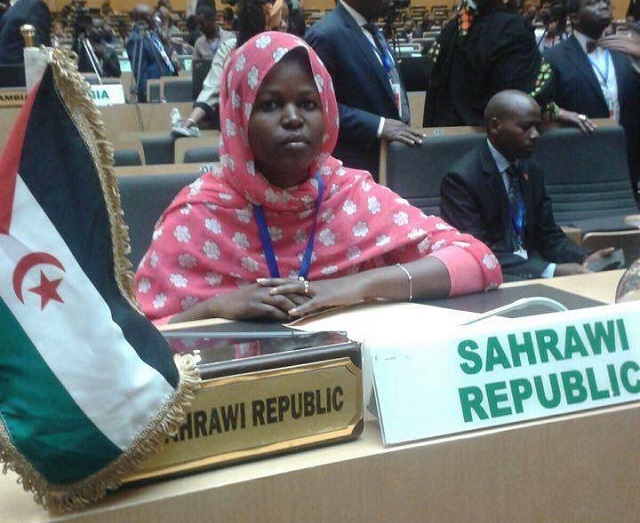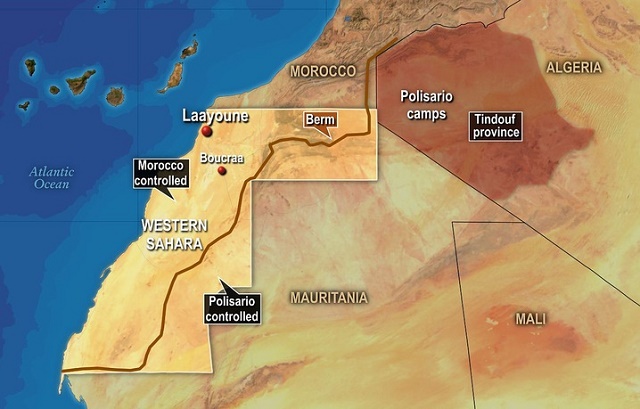Growing international recognition of Western Sahara offers new hope for Africa’s Last Colony Comment
New in Ceasefire, Politics - Posted on Thursday, August 25, 2016 19:12 - 5 Comments
By Khalil Asmar

Maria Eid Saila, third secretary at the SADR Embassy in Ethiopia, at a meeting at the Africa Union headquarters in Adis Ababa.
Recognising the rights of occupied peoples to exist as sovereign nations, in line with the requirements of international law, has always helped rebalance unjust political odds in their favour, as well as bolster international legality. As such, the growing official recognition of the Saharawi state by the international community represents a major essential step towards securing the Saharawi people’s right of self-determination, as underscored by the UN for the past 4 decades, particularly through resolution 1514 which first included Western Sahara in its list of non-self-governing territories; a resolution that subsequently was ratified by the International Court of Justice in its advisory opinion issued in 1975.
In 1976, and after three years of fierce armed resistance against the Spanish colonial presence, the Saharawis announced the proclamation of the Saharawi Arab Democratic Republic. This was primarily to fill-up the void caused by the sudden and anarchic withdrawal of the Spanish administration, which had been the colonial power in Western Sahara for more than 90 years. While the departure resulted in the territory being divided-up between Morocco and Mauritania following the “Madrid Treaty”, this was later rejected by international institutions, describing it as illegitimate.
The Polisario Front, the core body of the Saharawi republic and the political representative of the Saharawi people, launched an all pervasive war of liberation to push back the invaders whose actions had created an outpouring of tens of thousands of Saharawi refugees into neighboring Algeria. Although Mauritania subsequently pulled out of the territory, the Moroccan kingdom expanded its occupation by invading the parts that had been under de-facto Mauritanian control.
An Avalanche of Recognitions
Consistent with international law and in solidarity with the rights of the Saharawi people, African and South American nations were the strongest supporters of the Saharawi struggle for independence, unleashing a domino-like effect of recognitions of the Western Sahara Republic across the two continents. Likewise, other Asian countries have recognised the Saharawi republic, reaching a total of 84 countries worldwide. In contrast, no country has to date recognised Morocco’s sovereignty claims over the territory.
Thus, the colonial issue opposing Morocco to the Polisario Front, which had been politically mediated as a regional conflict, became an international one. In 1984, the Western Sahara Republic became a full state member of the Organisation of the African Union, and subsequently a founding member of its successor, the African Union (AU). Yet, these recognitions have only exacerbated the expansion of Moroccan occupation, aimed at wiping-out all forms of Saharawi existence in the areas under Moroccan control and creating, in the process, new facts on the ground with major coastal cities ending-up under Moroccan control while the remaining 25% of Western Sahara, a desert strip of more than 1000 km long, destined to be under the sovereignty of the Saharawi republic. Between the two portions stands a scar in the desert: the berm, a 2700 sand wall built by Morocco, fortified with barbed-wire fencing, artillery posts and crammed with millions of anti-tank and anti-personal land mines that are still claiming the lives of many Saharawis and their livestock.
In 1991, after sixteen years of armed struggle, the UN brokered a peace plan and the “MINURSO’'(the French acronym of the UN Mission for a Referendum in Western Sahara) was established. However, after 25 years of attempts to bring about this promised referendum, the UN peace settlement plan has failed to achieve its main objective: a plebiscite of self-determination.
Morocco’s control of the main “useful” part of Western Sahara, a 1000 km coastline that harbors one of the world’s richest fisheries stock, abundant phosphate rock mines and promising offshore oil reserves, has further driven it to impose a policy of ‘fait accompli’; a stance defended by France at the Security Council and which has been the main stumbling block preventing the implementation of international law in Western Sahara.
The two decades’ investment of the Polisario Front in the UN peace process scheme has, unequivocally, proven to be fruitless. As such, the internationalisation of the Saharawi struggle has become one of the avenues out of this protracted status-quo, and for seeking a way to rebalance the balance of power in favor of the occupied.

(Source: PBS)
Europe’s Landmark Decisions
The direction of the Polisario Front’s political efforts has swerved in recent years towards Europe. As a capstone to decades of diplomatic work, the Saharawis achieved a considerable breakthrough in the European continent in recent years. The first positive response came from the Scandinavian block, subsequently unleashing an avalanche of similar recognitions and other types of actions against the ongoing Moroccan occupation.
Indeed, the recognition of the Western Sahara republic has gained considerable momentum in a number of European Parliaments. In the UK, Italy and Slovenia, for instance, political groups and collectives have demanded recognition of the Saharawi republic, while motions for official recognition were passed by parliaments in Finland, Denmark and Norway.
In Sweden, after a parliamentary motion was passed in 2012 to recognize the Western Sahara republic, the government announced a U-Turn this year, thus contradicting tenants of its own foreign policy, as well as imperiled its cherished stance as a neutral promoter of human rights.
In Spain, the former colonial power, an overwhelming majority of the Spanish parliament deputies recently voted for the inalienable right of the Saharawi people to self-determination. Yet, despite an enormous support within Spanish civil and political circles, the position of the Spanish parliament and state is still viewed as shamefully lagging behind the advanced stances of the Spanish regional governments, which have demanded the recognition of the Saharawi republic and called for an end to Moroccan occupation – especially as the latter is largely a consequence of unethical historical failures by the Spanish monarchy that need to be addressed.
On the other hand, the EU court, after a lawsuit lodged by the Polisario Front, annulled in 2015 the EU-Morocco agricultural agreement due to its inclusion of products exported from the Saharawi occupied territories; a move viewed by some analysts as a landmark decision in the history of the occupation.
In a similar vein, the Polisario Front, through an approach with the Swiss Federal Council, has become party to the Geneva Convention, reinforcing its status as the sole representative of the Saharawi people and, inter alia, obliging firms involved in exploiting and plundering Western Saharan resources to abide by its legal authority in this non-self-governing territory.
In the context of the internationalisation of the Saharawi struggle, this important step will definitely be followed by others, offering an alternative path to the futile peace process currently staling under UN auspices. The statement made by Khatri Addouh, who heads the Polisario negotiating team, and served as interim president of the republic after the passing away of the late Mohamed Abdel Aziz, did not rule out the Saharawi Arab Democratic Republic seeking UN recognition as an observer state; a linchpin move that – once achieved – will enable the Saharawis to regain the initiative, enhance their presence at the international level and overcome the status-quo by creating its own new facts on the ground.
Such a move will strengthen the position of the Polisario Front at the negotiating table and reduce France’s influence at the Security Council, sidestepping its unjust and disproportionate support for Morocco in favor of support for a more pluralistic and democratic world.
Undoubtedly, the UN-sponsored peace plan in Western Sahara has tangibly collapsed; with the recent expulsion by Morocco of Minurso staffers a last nail in its coffin. However, the recognition by international institutions, individual governments, countries and states of the Saharawi Republic can still restore hope to the Saharawi people, drive away the looming resumption of armed hostilities, salvage the sanctity of international law and legality, and put an end to colonialism in Africa’s last colony.
5 Comments
Ahmed
[…] By Khalil Asmar For “CEASEFIREMAGAZINEE” […]
You get to be living on another planet brother…
You have to be blind to ignore the unexpected coup d etat led by Morocco in the Africa House…
Everything crumbling down and there is more to come…you better start planning for lining up with a prosperous nation proven by its stability, success, and promising future…thru phosphate, energy…etc
Of course you can chose to follow Nouakchott example and stay in misery forever…non viability!
Or keep prolonging the lives of the junta in Algiers, but for sure their time is ending soon,,,brave algerians,
Or keep dreaming for the establishment of a born dead nation of yours, which will never materialize…
Now which of these three alternatives is better suited for you..?
I trust our southern brothers and sisters are smart…hope you are too …
Go with GOD
WE ARE Just Shocked how this Dirty Goverment Conspire against all Moriccans !indeed we are LIVING OUT The MAP !! Our National Media just selling Lies n Shit to us !!after the Monarchy recognized officially the SR and Signed treaty with Netherland wich reduce its Sovereignity Sphere ,excluding all the desputed Area KNOWN AS WS , last is the full endorsement of AU Cinstitution ,WHAT left !!! the cowards After Sucking our blood n sweat for 50 years has just renounced our National cause and Sold out our Lands..Congratulation Sahrawi ppl!!!
Désolée, je ne lis pas l’anglais


The more countries recognize Western Sahara republic the more France hegemony on this colonial issue gets pounded. Great article by this Sahrawi writer !